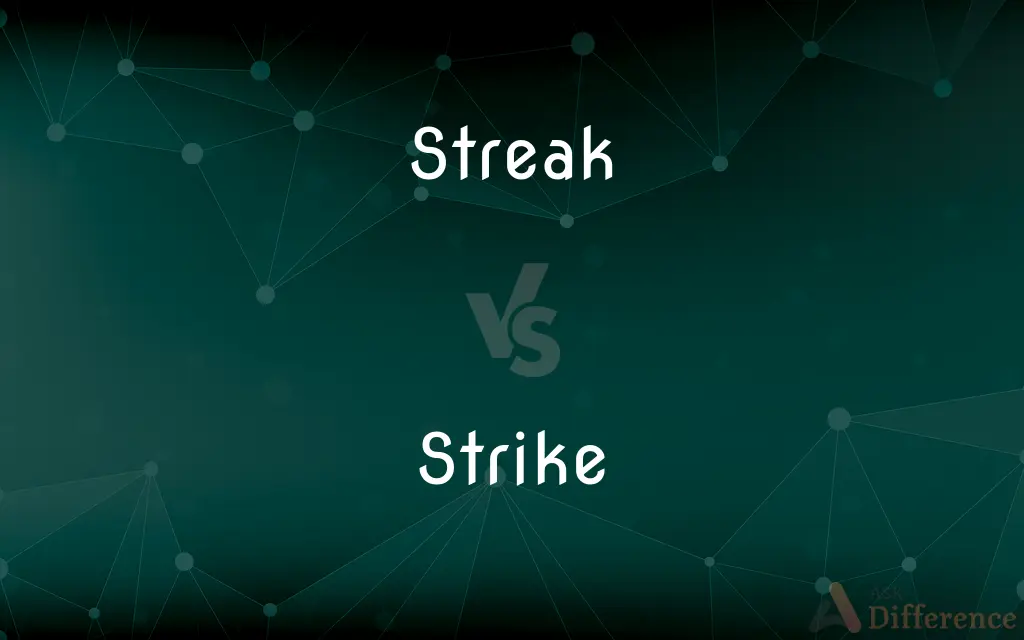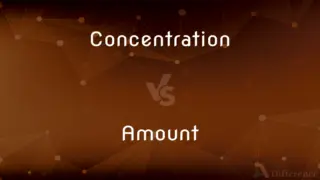Streak vs. Strike — What's the Difference?
By Tayyaba Rehman & Fiza Rafique — Updated on March 2, 2024
A streak is a continuous period of specified success or characteristics, while a strike refers to hitting or attacking someone or something forcefully or the act of ceasing work in protest against working conditions.

Difference Between Streak and Strike
Table of Contents
ADVERTISEMENT
Key Differences
A streak typically refers to an unbroken series of events or occurrences showcasing a particular characteristic, often used in the context of sports, games, or personal achievements. For example, a winning streak in basketball signifies consecutive victories without a loss in between. On the other hand, a strike has multiple meanings depending on the context. In a physical sense, to strike means to hit or attack something or someone forcefully. This action can be deliberate, such as a boxer striking an opponent, or accidental, like a car striking a post.
Streaks can also describe patterns of behavior or occurrences in various contexts, emphasizing the continuity and repetition of success or a specific attribute over time. In a labor context, a strike refers to a collective action undertaken by workers who stop working to protest against their employers over issues such as wages, working conditions, or benefits. Strikes aim to exert pressure on employers to address the workers' demands.
While both streaks and strikes indicate action or movement, their contexts and implications differ significantly. A streak is generally positive, highlighting ongoing success or the persistence of a particular trait, whereas a strike involves conflict or confrontation, whether it's a physical collision or a collective labor protest.
The concept of a streak is often associated with momentum and continuity in achieving positive outcomes, reflecting consistency in performance or occurrence. In contrast, a strike, especially in the labor sense, is a disruption, a break from the norm intended to bring about change or highlight grievances. The physical act of striking denotes a sudden impact or attack, emphasizing the force and intent behind the action.
Streaks are about maintaining a continuous pattern of success or characteristics, while strikes are about impactful actions, either as a form of protest or a physical hit. The use of each term brings to the forefront different dynamics of human activities and interactions, from competitive achievements to social and labor disputes.
ADVERTISEMENT
Comparison Chart
Definition
A continuous period of success or characteristics.
Hitting forcefully or ceasing work in protest.
Context
Often sports, games, achievements.
Physical action or labor relations.
Connotation
Generally positive, indicating consistency.
Can be negative, suggesting conflict or confrontation.
Purpose
To highlight ongoing success or traits.
To exert force or pressure, or demand change.
Example Usage
"She's on a winning streak in tennis tournaments."
"The workers voted to strike for better wages."
Compare with Definitions
Streak
Can refer to consistent characteristics.
He has a streak of generosity that everyone admires.
Strike
Can refer to labor action to demand changes.
The factory workers decided to strike over unsafe working conditions.
Streak
Often used in sports and competitive contexts.
The player is on a hot streak, scoring in every game this season.
Strike
Strikes involve stopping work as a protest.
The teachers' strike has closed schools across the district.
Streak
Reflects a pattern of behavior or occurrence.
The city has a streak of sunny days in the forecast.
Strike
The act of striking can be deliberate or accidental.
Lightning struck the tree during the storm.
Streak
Streaks emphasize duration and consistency.
Her streak of perfect attendance at school is impressive.
Strike
Involves exerting pressure or making an impact.
The new policy struck a balance between growth and sustainability.
Streak
A streak is a continuous series of successes or events.
The team's winning streak has energized its fan base.
Strike
To strike means to hit something forcefully.
The boxer struck his opponent with a powerful uppercut.
Streak
A long, thin line or mark of a different substance or colour from its surroundings
A streak of oil
Strike
To hit sharply, as with a hand, fist, weapon, or implement
Struck the table in anger.
Strikes the ball with a nine iron.
Struck the nail with a hammer.
Streak
An act of running naked in a public place so as to shock or amuse others
A streak for charity
Strike
Any actual or constructive striking at the pitched ball, three of which, if the ball is not hit fairly, cause the batter to be put out; hence, any of various acts or events which are ruled as equivalent to such a striking, as failing to strike at a ball so pitched that the batter should have struck at it.
Streak
A marking of a different color or texture from the background
Strike
Produce by ignition or a blow;
Strike fire from the flintstone
Strike a match
Streak
Move quickly in a straight line;
The plane streaked across the sky
Strike
Drive something violently into a location;
He hit his fist on the table
She struck her head on the low ceiling
Common Curiosities
Can a streak be negative?
Yes, a streak can be negative if it involves a series of undesirable events or outcomes, such as a losing streak.
What role does negotiation play in ending a strike?
Negotiation is crucial, as it involves discussions between workers and employers to reach an agreement that addresses the issues leading to the strike.
Can someone have a streak in personal habits?
Yes, individuals can have streaks in personal habits, such as consecutive days of exercise or maintaining a daily journal.
What is the purpose of a winning streak in sports?
It showcases a team's or individual's consistent success over a series of matches, contributing to morale and standings.
How does a strike affect a business?
Strikes can halt production, disrupt services, and potentially lead to financial losses and public relations challenges for a business.
Why do workers go on strike?
Workers strike to protest against inadequate wages, poor working conditions, or other grievances, seeking to compel employers to negotiate improvements.
Is a strike always related to labor issues?
While commonly associated with labor disputes, the term "strike" can also refer to hitting or attacking forcefully in various contexts.
How long can a streak last?
A streak lasts as long as the series of successes or specific characteristics continue without interruption.
How do streaks affect competition in sports?
Streaks can influence competition by boosting confidence and momentum for those on winning streaks, while posing psychological challenges for opponents.
What are some common strategies to resolve a strike?
Negotiations, mediation, and sometimes arbitration are used to address the demands of striking workers and resolve the dispute.
Share Your Discovery

Previous Comparison
Concentration vs. Amount
Next Comparison
Barracuda vs. SnoekAuthor Spotlight
Written by
Tayyaba RehmanTayyaba Rehman is a distinguished writer, currently serving as a primary contributor to askdifference.com. As a researcher in semantics and etymology, Tayyaba's passion for the complexity of languages and their distinctions has found a perfect home on the platform. Tayyaba delves into the intricacies of language, distinguishing between commonly confused words and phrases, thereby providing clarity for readers worldwide.
Co-written by
Fiza RafiqueFiza Rafique is a skilled content writer at AskDifference.com, where she meticulously refines and enhances written pieces. Drawing from her vast editorial expertise, Fiza ensures clarity, accuracy, and precision in every article. Passionate about language, she continually seeks to elevate the quality of content for readers worldwide.
















































